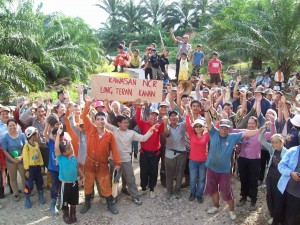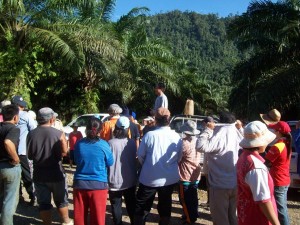
After fighting for the return of their ancestral lands for more than a decade, the people of Long Teran Kenan in Malaysian Borneo took a stand earlier this month and reclaimed part of their homeland with a decisive and peaceful act of collective resistance. Their territory had been taken from them and converted into oil palm plantations, which are now owned by the notorious global palm oil giant IOI Group.
In Malaysian Borneo, 2.3 million hectares of land have been converted into palm oil plantations, and there are plans to double that area within the next ten years. However, the Long Teran community has drawn a line in the sand by occupying two palm oil plots that IOI had continued to harvest despite a historic March 2010 decision by a Malaysian court that ruled the plots in question were indeed on native customary lands.
In November 2009, IOI promised not to appeal the court’s decision when it was made. IOI has now not only appealed the decision but has also continued to operate illegally on Indigenous lands and has even gone so far as to break off all negotiations with the community.
Support the people of Long Teran by taking action today.
Negotiations Fall Apart – Police Allow Re-Occupation of Lands to Continue
Last November, RAN participated in a negotiation where Marc den Hartog and Rina Rahayu Latar of IOI Group committed to work diligently to resolve the long-standing conflict at Long Teran. After months of inaction from IOI following the community’s court victory, the people of Long Teran called in the local police to ask IOI Group to leave their native lands where the company does not have the community’s permission to operate.
A few days later, with the court ruling behind them, the community blockaded access to the IOI Group plots, re-seized control of their ancestral lands, and started their own community palm oil harvesting. They were able to successfully sell the palm fruits harvested to a neighboring mill and are determined to make their own decisions on land that was stolen from them in the name of “progress”. A community meeting to discuss daily harvesting plans can be seen in the image below, and if you look carefully you will see the natural forest in the background.
Controversial IOI Palm Oil Trafficked into American Grocery Stores
 For American consumers the story does not end with this inspiring example of one community determined to defend its Indigenous lands. IOI Group is a known supplier to Cargill, long a primary target of Rainforest Action Network. The story from this community is only one of many we hear from the rainforests of Borneo and beyond, stories of communities that have been devastated by the global demand for palm oil.
For American consumers the story does not end with this inspiring example of one community determined to defend its Indigenous lands. IOI Group is a known supplier to Cargill, long a primary target of Rainforest Action Network. The story from this community is only one of many we hear from the rainforests of Borneo and beyond, stories of communities that have been devastated by the global demand for palm oil.
Cargill is the number one importer of palm oil into the US, with palm oil now found in half of all packaged foods found on grocery store shelves. This gives Cargill enormous influence over global palm oil markets, including how palm oil is produced, refined and distributed. For more than three years, RAN has pushed Cargill to adopt basic safeguards that would ensure the company is not importing human rights violations, rainforest destruction, and climate change. Because Cargill has to date failed to institute these safeguards, controversial palm oil is still found throughout American supermarkets.
As we all watch the story of Long Teran Kenan unfold, we are struck by two questions weighing heavily on our minds:
1) Will IOI Group negotiate in good faith or will it continue to use legal technicalities and contest the legitimacy of the Indigenous community?
2) How many case studies of dirty suppliers will it take to convince Cargill that safeguards are needed on its supply chain?
Please join RAN by taking action today in solidarity with the people of Long Teran!











